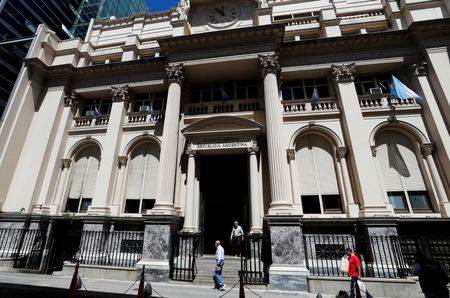By Jorge Otaola
BUENOS AIRES (Reuters) – The Argentine central bank’s already depleted reserves are coming under renewed pressure, as grains exports from the South American nation have stalled following a soybean sales bonanza and a drought that is hitting wheat and corn.
The country’s central bank sold some $150 million on Monday, the largest daily fall in reserves since early August, traders told Reuters, adding to drops of some $368 million last week and $72 million the week before. It sold $145 million on Tuesday.
A government-spurred soybean export push in September helped bring in some $5 billion in hard currency reserves for the country, which sorely needs dollars to make future payments to the International Monetary Fund (IMF) and private creditors.
Amid a slowdown in grains sales for the world’s top exporter of processed soy and No. 3 corn exporter and continued demand for dollars among importers, the central bank has already given up around one-fifth of those gains, data collated by Reuters show, despite tighter measures to defend reserves.
Argentina: building reserves? https://graphics.reuters.com/ARGENTINA-ECONOMY/egpbkoralvq/chart.png
“The picture is getting more complicated as supply (of dollars) falls and demand does not give up, despite greater exchange restrictions and differential exchange rates,” local clearing agent Cohen said in a note.
“The exchange rate tension returned earlier than expected.”
Argentina is facing a major and protracted drought, and recent frosts hammered wheat harvest forecasts and forced farmers to delay planting of soy in the country’s core farm belt region, risking billions of dollars in potential losses.
Inflation is also heading towards 100% this year, while pressure has also been rising on the local peso currency, with increasing numbers of parallel exchange rates far removed from the official spot rate raising expectations of a devaluation.
“At some point the devaluation jump will take place, but the political context must be taken into account,” said economist Juan Carlos De Pablo, referring to general elections next year.
(Reporting by Jorge Otaola; Writing by Adam Jourdan; Editing by Paul Simao)

